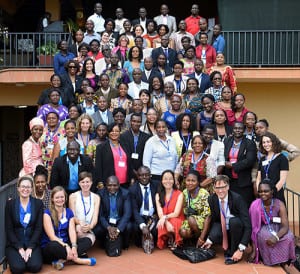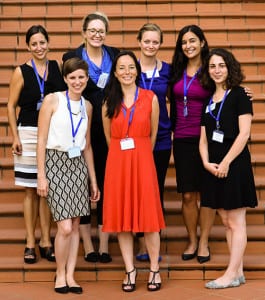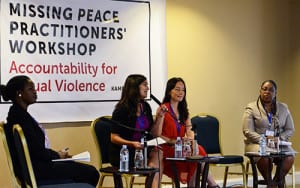
By Andrea Lampros
The Missing Peace Practitioners’ Workshop in Kampala, Uganda in August—co-hosted by the Human Rights Center at Berkeley Law—helped bring together more than 80 doctors, nurses, prosecutors, police chiefs, judges, forensic experts, and civil society advocates who work directly with sexual violence survivors in Africa, in countries currently or recently embroiled in armed conflict.
Kim Thuy Seelinger, director of the Human Rights Center’s Sexual Violence Program, and Julie Freccero, the program’s associate director, opened the workshop by presenting new research on sexual violence—a four-country report entitled The Long Road: Accountability for Sexual Violence in Conflict and Post-Conflict Settings. (The Guardian covered the workshop—and the report’s findings.)
Many participants had been interviewed for The Long Road and were keen to hear its findings and recommendations—which sparked new discussions over the three-day workshop.
“This is one of those things we do best—convene the people who are on the front lines, who take the greatest risks and know the most about defending human rights,” said Alexa Koenig, executive director of the Human Rights Center. “This workshop enabled first responders from Kenya, Uganda, Sierra Leone, Liberia, Democratic Republic of Congo, and South Sudan to share their expertise and strategies for improving the reporting, investigation, and prosecution of sexual violence.”
Global awareness about sexual violence during conflict has intensified with the mass abuses committed by Boko Haram in Nigeria and the so-called Islamic State in Iraq and Syria. The high-profile UK Summit to End Sexual Violence in Conflict led by Angelina Jolie and William Hague last summer further accelerated international awareness. Despite this attention, it is rare for people who are working daily with survivors in different African countries, to meet face to face to share experiences and resources, explained Freccero.

“Police officers from Uganda met with police from Liberia, and nurses from sexual violence clinics in Kenya met with their counterparts in Democratic Republic of Congo,” Freccero said. “We had truly meaningful, practical conversations about improving the response to sexual violence.”
A Collaborative Effort
Led by Seelinger, The Long Road researchers interviewed 279 practitioners and policymakers over several years to understand the barriers to reporting, investigating, and prosecuting cases of sexual violence in Kenya, Liberia, Uganda, and Sierra Leone. A fifth report from Democratic Republic of Congo is forthcoming.
Berkeley Law students, including graduates Lisa-Marie Rudi ’13, LL.M, Amy Belsher ’14, Saira Hussain ’13, Anthony Bestafka-Cruz ’13, Michelle Ben-David ’13, Nila Natarajan ’12, and Lea Nehme ’12, helped with field research in Uganda, Kenya, and Liberia. Golda Calonge ’16 provided desk research. Audrey Whiting, who will graduate with a Master of Development Practice from UC Berkeley this year, spent three months with the Uganda Fund in Gulu, northern Uganda, to organize the workshop. Naomi Fenwick ’15 LL.M. interpreted for French speakers from the Democratic Republic of Congo at the workshop. The Long Road found that prosecuting sexual violence as an international crime—a war crime, crime against humanity, or act of genocide—is extremely difficult because of the limited resources that prevent conflict-affected countries from gathering and storing evidence or properly protecting witnesses.
“So often during our research, we heard about police officers who didn’t have a car or motorbike so they couldn’t travel to the crime scene,” said Seelinger. ““If we really want to see national courts prosecute sexual violence as a war crime or crime against humanity, we need to look downstream and understand how the local nurse or police officer does her work. We need to see what support she needs both in peacetime and in periods of armed conflict.”
Freccero said that she visited health centers with only one nurse attending a crowded waiting room of patients, where she was told it wasn’t feasible to complete lengthy documentation of sexual violence or collect evidence for court.

“If we don’t understand why systems fail to function properly during peacetime, we will never be able to ensure an effective response during armed conflict,” said Seelinger.
Researchers found that strengthening the ability of survivors to report crimes during crises is key to later prosecuting those crimes and that medical professionals can provide critical documentation that is essential to proving crimes. They also found that witnesses must be better protected to end impunity for sexual violence.
The report recommends that the international crimes specified in the Rome Statute, the treaty that established the International Criminal Court, be integrated into national laws so that governments can effectively prosecute sexual violence as an international crime. It also recommends more resources and better training for nurses, doctors, police, and prosecutors locally.
Shared objectives
Co-hosted by the Uganda Fund, U.S. Institute of Peace, Women in International Security, and the Peace Research Institute of Oslo, the workshop opened with remarks by Innocent Balemba Zahinda, who heads the office of the UN’s special representative on sexual violence.
“We are witnessing sexual violence being used as a tactic of terrorism, promoted and systematized to advance ideological and political agendas,” Zahinda said of recent challenges associated with violent extremism. “Sexual violence is used to displace and destroy communities.”
He called on workshop participants to devise new approaches to supporting survivors and seeking justice.
To that end, at the close of the workshop, participants pledged to continue to work together, making plans for regional collaboration and information sharing.
“This is an opportunity for us to continue the conversation about the advances we make or even steps we take back as we fight impunity for sexual violence,” said Dr. Desiré Alumeti Munyali, a forensic specialist who works at Panzi Hospital in eastern Democratic Republic of Congo—a hospital that provides holistic care for survivors of rape.
At the request of workshop participants, the Human Rights Center will establish an online repository of resources (including training manuals and guidelines) on sexual violence to advance efforts across borders. The center will also create an online community for workshop participants and other colleagues to stay in touch to exchange updates, new resources, and advice about their common work.
“I think we have found a voice which should be used to advance our shared objectives in every potential forum,” said Ambassador Allan Rock, president of the University of Ottawa and board director of the Uganda Fund, at the close of the workshop. “We will find a way to ensure that the momentum that’s been created will not be lost.”
Naasu Genevieve Fofanah, former gender adviser to the president of Sierra Leone, captured the sentiment of workshop participants who drew strength in sharing experiences and finding ways to combat sexual violence, even in the midst of war or humanitarian disasters, such as the outbreak of Ebola in West Africa.
“Africans, we should be proud of our region and how rich we are in expertise,” Fofanah said.